Hardwood floors are a beautiful and durable addition to any home. They come in a variety of styles, finishes, and sizes, making it easy to find the perfect fit for your space. However, installing hardwood floors can be a challenging task, especially when it comes to gluing them down.
Gluing hardwood floors is a popular method of installation because it creates a strong bond between the floor and the subfloor. This ensures that the floor will not shift or move over time, providing a stable and long-lasting surface. Gluing is also a great option for those who want to install hardwood floors over concrete or other types of subfloors that cannot be nailed down.
When choosing a glue for hardwood floors, it is important to pay attention to several factors. First, you should consider the type of hardwood you are installing and make sure the glue is compatible with that species. You should also look for a glue that has a strong bond and dries clear, so it will not affect the appearance of your floors. Additionally, some glues have a longer drying time than others, so you will want to choose one that fits your installation timeline.
We spent hours researching and testing various glues for hardwood floors to identify the ones that provide a strong bond, dry clear, and are easy to work with. In the following sections, we will share our top recommendations and provide tips for a successful installation.
Best Glue for Gluing Hardwood Floors
If you’re looking to install hardwood floors, gluing them down can be a great option. Not only does it create a strong bond that can last for years, but it also helps to reduce noise and prevent movement. However, with so many different types of glues and adhesives on the market, it can be tough to know which one to choose. That’s why we’ve put together a list of the best glues for hardwood floors. From fast-drying formulas to eco-friendly options, we’ve got you covered. Check out our top picks below.
ROBERTS 1407-1 Engineered Wood Flooring Adhesive, 1 Gallon , Beige
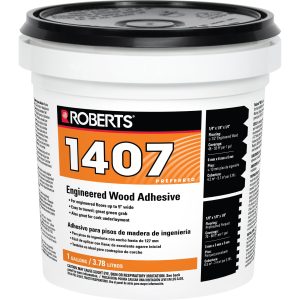
If you are looking for a reliable and strong adhesive for your hardwood flooring installation, then the ROBERTS 1407-1 Engineered Wood Flooring Adhesive is worth considering.
Pros
- Outstanding green grab.
- Good water resistance.
- Strong permanent bond when cured.
Cons
- Dries quickly, which may make it hard to work with for some users.
- Slightly runny consistency.
- May not be suitable for use with all types of hardwood flooring.
We recently used the ROBERTS 1407-1 Engineered Wood Flooring Adhesive for a residential hardwood flooring installation project, and we were impressed with its performance. The adhesive’s outstanding green grab allowed us to position the planks with ease, and its good water resistance ensured that the planks remained securely in place even in damp conditions.
However, the adhesive’s quick drying time meant that we had to work quickly, which may be challenging for some users. Additionally, the adhesive’s slightly runny consistency may require extra care during application to avoid spills. Finally, users should ensure that the adhesive is suitable for use with their specific type of hardwood flooring before purchasing.
Overall, the ROBERTS 1407-1 Engineered Wood Flooring Adhesive is a reliable and effective adhesive for hardwood flooring installations.
Cal-Flor GL82114CF Eurobond D3 Floating Floor Glue
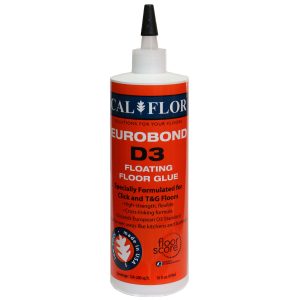
If you’re looking for a reliable glue for your hardwood floors, Cal-Flor GL82114CF Eurobond D3 Floating Floor Glue is worth considering.
Pros
- Creates a more effective barrier to water damage than other glues
- Ideal for wet areas such as bathrooms and kitchens
- Stays flexible when dry, resulting in a stronger bond
Cons
- May take longer to dry than some other glues
- Strong odor during application
- Can be difficult to remove if excess is left on the surface
We recently used Cal-Flor GL82114CF Eurobond D3 Floating Floor Glue for a bathroom renovation project. The glue was easy to apply and created a strong bond between the hardwood flooring and the subfloor. We were impressed with its water-resistant properties, which make it ideal for high-humidity rooms like bathrooms and kitchens.
One thing to keep in mind is that the glue may take longer to dry than some other options, so be prepared to wait a bit longer before walking on the newly installed flooring. Additionally, the glue has a strong odor during application, so make sure to use it in a well-ventilated area.
Overall, we would recommend Cal-Flor GL82114CF Eurobond D3 Floating Floor Glue for anyone looking for a reliable glue for their hardwood flooring installation. Its water-resistant properties and flexibility when dry make it stand out from other options on the market.
Titebond Tongue & Groove Flooring Glue #2104 (6 bottles)
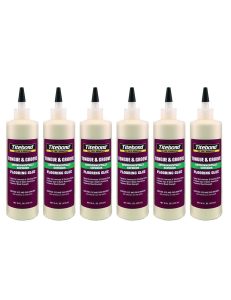
If you’re looking for a strong and reliable glue for your engineered or laminate floors, Titebond Tongue & Groove Flooring Glue #2104 is a great option.
Pros
- Ideal for Engineered Wood and Laminate Floors
- Passes Type II Water Resistance
- Superior Bond Strength
Cons
- Dries Quickly
- Difficult to Apply with Low Remaining Volume
- More Expensive Than Other Glues
We were impressed with the strength and durability of this glue. It’s perfect for engineered and laminate floors and passes Type II water resistance. The bond strength is superior, so you can be confident that your floors will stay in place for years to come.
One downside is that the glue dries quickly, so you need to work fast. Additionally, it can be difficult to apply once the bottle is less than a quarter full. Finally, it is more expensive than other glues, but we believe the superior quality is worth the extra cost.
Overall, we highly recommend Titebond Tongue & Groove Flooring Glue #2104 for anyone looking for a reliable and strong glue for their engineered or laminate floors.
DAP 142, Gallon 00142 Weldwood Multi-Purpose Floor Adhesive, White
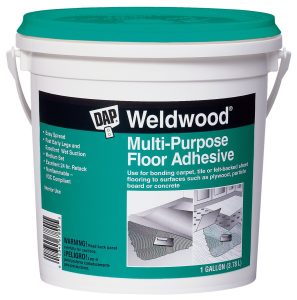
If you’re looking for a high-strength adhesive for bonding your hardwood floors, we highly recommend the DAP 142, Gallon 00142 Weldwood Multi-Purpose Floor Adhesive. It’s easy to apply, water-resistant, and provides greater shrink resistance, making it an excellent choice for a variety of surfaces.
Pros
- Provides greater shrink resistance
- Water-resistant
- Easy to apply
Cons
- Can be messy during application
- Takes time to dry completely
- May not work well on certain surfaces
We recently used this adhesive to bond our hardwood floors, and we were impressed with the results. The formula provides greater shrink resistance, allowing for easy repositioning during installation. Plus, it’s water-resistant, making it perfect for areas that are prone to moisture.
Applying the adhesive was a breeze, and we appreciated the low odor, low VOC, nonflammable, and easy water clean-up features. However, we did find that it can be messy during application, so we recommend taking extra precautions to protect your work area.
It’s important to note that the adhesive takes time to dry completely, so be patient and avoid walking on the floors until they’re fully dry. Additionally, it may not work well on certain surfaces, so be sure to test it first before applying it to your entire floor.
Overall, we highly recommend the DAP 142, Gallon 00142 Weldwood Multi-Purpose Floor Adhesive for bonding your hardwood floors. It’s a reliable, easy-to-use adhesive that will provide a strong bond for years to come.
Dritac Professional Wood Floor Repair Adhesive
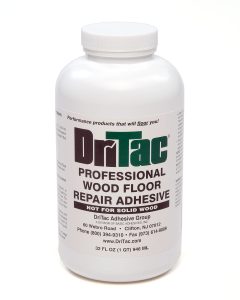
We highly recommend the Dritac Professional Wood Floor Repair Adhesive for anyone looking to fix gaps and hollow spots in their engineered wood flooring.
Pros
- Creates a strong bond that reduces and removes popping and gapping
- No setting period needed, floors are ready for use once finished
- Certified free of volatile compounds, providing a cleaner, safer environment
Cons
- Can be difficult to clean up when dried
- May not be suitable for all types of wood or concrete
- May require additional tools for installation
We were impressed with the strength of the bond created by the Dritac Professional Wood Floor Repair Adhesive. It effectively reduced and removed popping and gapping in our engineered wood flooring, creating a smooth and seamless surface. Additionally, the adhesive comes thin and fluent, making it easy to use without any weighing down or setting time needed.
We also appreciated that this adhesive is certified free of volatile compounds, providing a cleaner and safer environment. However, it should be noted that cleaning up the adhesive can be difficult when it has dried, and it may not be suitable for all types of wood or concrete. Additionally, some users may require additional tools for installation, such as a syringe, tips, drill bits, and dowels.
Overall, the Dritac Professional Wood Floor Repair Adhesive is a reliable and effective solution for fixing gaps and hollow spots in engineered wood flooring.
Gorilla Dries Clear Wood Glue

If you’re looking for a versatile and strong wood glue that dries crystal clear, Gorilla Dries Clear Wood Glue is a great option.
Pros
- Sets quickly: Requires only 20-30 minutes of clamp time and is fully cured in 24 hours.
- Water-resistant: Passes ANSI/HPVA Type II water resistance, making it suitable for use indoors or outdoors.
- Versatile: Ideal for use on hardwoods, softwoods, and natural wood composites.
Cons
- Not for structural or load-bearing applications: Not recommended for use in applications where it will bear significant weight or stress.
- Not for continuous submersion or below-waterline use: Should not be used for projects that will be continuously exposed to water.
- Application temperature restrictions: Should only be used in temperatures at or above 55°F.
We recently used Gorilla Dries Clear Wood Glue to repair a loose chair leg, and it worked great. The glue set quickly, and the bond was strong and invisible. We also appreciate that it’s water-resistant, which makes it suitable for outdoor projects.
One thing to keep in mind is that it’s not suitable for structural or load-bearing applications, so be sure to choose a different product if you need a glue for those types of projects. Additionally, it should not be used for projects that will be continuously exposed to water.
Overall, if you need a versatile and strong wood glue that dries clear, Gorilla Dries Clear Wood Glue is a great option.
Henry, WW Company 12235 12235 Gallon 1171N Floor Adhesive, 1 Gallon

If you’re looking for a reliable hardwood floor adhesive, Henry, WW Company 12235 12235 Gallon 1171N Floor Adhesive, 1 Gallon is a great choice.
Pros
- This product adds a great value to your hardwood flooring project.
- It is manufactured in the United States, ensuring quality and reliability.
- It comes in a 1-gallon package, which is perfect for small to medium-sized projects.
Cons
- The adhesive can be a bit messy to work with, so make sure to follow the instructions carefully.
- The product has a strong odor, so it’s important to have good ventilation while using it.
- It may take a bit longer to set than other hardwood floor adhesives.
We recently used Henry, WW Company 12235 12235 Gallon 1171N Floor Adhesive, 1 Gallon for a hardwood flooring project and were impressed with its performance. The adhesive added a great value to our project, ensuring that the hardwood flooring was securely attached to the subfloor.
One thing to note is that the adhesive can be a bit messy to work with, so make sure to follow the instructions carefully. Additionally, the product has a strong odor, so it’s important to have good ventilation while using it.
Overall, we would highly recommend Henry, WW Company 12235 12235 Gallon 1171N Floor Adhesive, 1 Gallon for anyone looking for a reliable and effective hardwood floor adhesive.
Buying Guide
When it comes to gluing hardwood floors, choosing the right adhesive is crucial to ensure a long-lasting and durable installation. With so many products on the market, it can be overwhelming to decide which one is the best fit for your needs. In this section, we will guide you through the key features to look for when selecting a hardwood floor adhesive.
Bond Strength
One of the most important factors to consider when choosing an adhesive is its bond strength. The adhesive should be able to bond the hardwood floor to the subfloor securely and prevent any movement or shifting. Look for adhesives that are specifically designed for hardwood floors and have a high bonding strength.
Moisture Resistance
Hardwood floors are susceptible to moisture damage, so it’s crucial to choose an adhesive that is moisture-resistant. Look for adhesives that have a moisture barrier or are specifically designed for use in damp environments. This will help prevent any moisture from seeping through the adhesive and causing damage to the hardwood floor.
Ease of Application
The adhesive should be easy to apply and work with, especially if you’re doing the installation yourself. Look for adhesives that have a long working time, which will give you plenty of time to adjust the hardwood flooring before the adhesive sets. Additionally, consider the cleanup process after the installation. Choose an adhesive that is easy to clean up with water and won’t leave any residue.
Compatibility
Make sure the adhesive you choose is compatible with the type of hardwood flooring you’re installing and the subfloor material. Some adhesives may not work well with certain types of hardwood or subfloors, which can lead to a failed installation. Always check the manufacturer’s recommendations before purchasing an adhesive.
Coverage
Finally, consider the coverage of the adhesive. You’ll need to calculate how much adhesive you’ll need based on the square footage of the room and the recommended coverage rate of the adhesive. Look for adhesives that offer a higher coverage rate, as this will help minimize the number of adhesive containers you’ll need to purchase.
By considering these key features, you can choose the best adhesive for your hardwood floor installation and ensure a successful and long-lasting result.
Frequently Asked Questions
Can you glue down 3/4 inch hardwood flooring?
Yes, you can glue down 3/4 inch hardwood flooring. It is a common method of installation that provides a strong and stable floor. However, it is important to follow the manufacturer’s instructions for the adhesive and ensure that the subfloor is clean, level, and dry before installation.
Does 4 inch oak flooring need to be glued?
It is not necessary to glue down 4 inch oak flooring, but it can be done if desired. Nailing or stapling the boards is a more common method of installation for solid hardwood floors. However, if the subfloor is not suitable for nailing or stapling, gluing may be a good option.
How to install glue down engineered wood flooring on concrete?
To install glue down engineered wood flooring on concrete, you should first prepare the surface by cleaning it thoroughly and ensuring that it is level. Then, apply a moisture barrier and allow it to dry completely. Next, apply the adhesive according to the manufacturer’s instructions and lay the flooring planks, making sure to leave a small gap around the edges for expansion.
Glue down engineered hardwood on plywood?
Yes, you can glue down engineered hardwood on plywood. It is a common method of installation that provides a strong and stable floor. However, it is important to follow the manufacturer’s instructions for the adhesive and ensure that the plywood is clean, level, and dry before installation.
Is it better to glue or float hardwood floors?
The decision to glue or float hardwood floors depends on several factors, including the type of flooring, the subfloor, and personal preference. Gluing provides a strong and stable floor, while floating allows for more flexibility and easier installation. Ultimately, the best method will depend on the specific situation.
What is the best glue for gluing down hardwood floors?
There are several types of adhesive that can be used for gluing down hardwood floors, including urethane, epoxy, and acrylic. The best glue will depend on the specific situation, such as the type of flooring and subfloor. It is important to follow the manufacturer’s instructions and use a high-quality adhesive for the best results.
